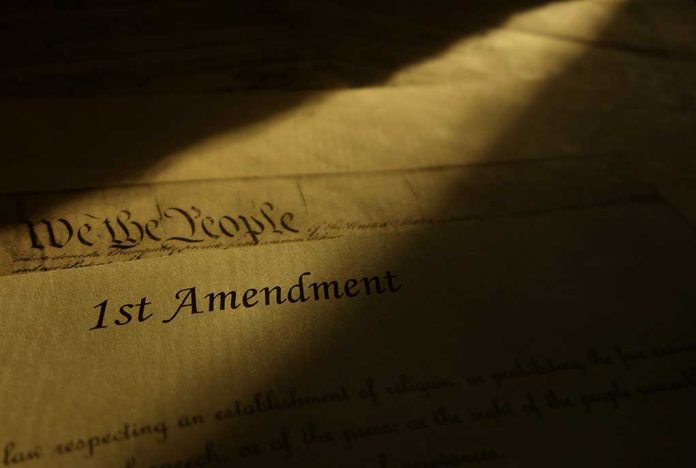
A citizen journalist’s arrest in Texas sparks a nationwide debate on press freedom and the First Amendment.
At a Glance
- Priscilla Villarreal, a citizen journalist in Laredo, Texas, was arrested for soliciting information from public officials.
- The case, Villarreal v. Alaniz, could have significant implications for First Amendment protections for journalists.
- The 5th U.S. Circuit Court of Appeals dismissed Villarreal’s lawsuit, citing qualified immunity for police and prosecutors.
- The case highlights the tension between press freedom and government secrecy.
Citizen Journalist’s Arrest Sparks Constitutional Debate
In a case that has captured national attention, Priscilla Villarreal, known locally as “La Gordiloca,” found herself at the center of a First Amendment controversy. Villarreal, a citizen journalist with a large following in Laredo, Texas, was arrested for allegedly violating a state law by soliciting non-public information from a public servant. This arrest has ignited a fierce debate about the boundaries of press freedom and the extent of government authority to restrict access to information.
The case, Villarreal v. Alaniz, has now reached the U.S. Supreme Court, where its consideration could potentially redefine First Amendment protections for journalists across the nation. At the heart of the matter is whether Villarreal’s actions, which many argue are common journalistic practices, can be criminalized under state law.
This is Priscilla Villarreal.
Priscilla is an independent journalist who was jailed by police and prosecutors in Laredo, TX, for her First Amendment-protected news reporting.
The federal district and appeals court ruled the officials who turned basic journalism into a crime do… pic.twitter.com/q3pf8vEO3A
— FIRE (@TheFIREorg) April 23, 2024
Legal Battle Unfolds in the 5th Circuit
The legal journey of Villarreal’s case has been complex. Initially, a three-judge panel of the 5th U.S. Circuit Court of Appeals ruled in her favor. However, in an unusual move, all 16 judges of the 5th Circuit convened to rehear the case. The result was a 9-7 decision dismissing Villarreal’s lawsuit, citing qualified immunity for the police and prosecutors involved in her arrest.
“Villarreal and others portray her as a martyr for the sake of journalism,” Jones wrote. “That is inappropriate. She could have followed Texas law, or challenged that law in court, before reporting nonpublic information from the backchannel source. By skirting Texas law, Villarreal revealed information that could have severely emotionally harmed the families of decedents and interfered with ongoing investigations. Mainstream, legitimate media outlets routinely withhold the identity of accident victims or those who committed suicide until public officials or family members release that information publicly. Villarreal sought to capitalize on others’ tragedies to propel her reputation and career.”
Implications for Press Freedom
The Villarreal case has broader implications for journalism and the application of qualified immunity in First Amendment cases. It raises crucial questions about how far state secrecy can extend without infringing on journalistic inquiry and overall freedom of the press. The case also highlights the tension between the need for government transparency and the protection of sensitive information.
“If the First Amendment means anything, it surely means that a citizen journalist has the right to ask a public official a question, without fear of being imprisoned. Yet that is exactly what happened here: Priscilla Villarreal was put in jail for asking a police officer a question,” Judge James C. Ho wrote in a strongly worded opinion. “If that is not an obvious violation of the Constitution, it’s hard to imagine what would be. And as the Supreme Court has repeatedly held, public officials are not entitled to qualified immunity for obvious violations of the Constitution.”
The outcome of this case could have far-reaching consequences for both citizen and professional journalists across the country. It may set a precedent for how courts interpret the balance between press freedoms and government interests in maintaining confidentiality.
A Pivotal Moment for American Journalism
As the Supreme Court considers whether to take up Villarreal v. Alaniz, the journalistic community watches closely. The decision could either reinforce the protections afforded to the press under the First Amendment or potentially create new limitations on journalistic practices. For Villarreal, the case represents more than just her personal fight; it’s about ensuring the right to report news without fear of government retaliation.
The Villarreal case serves as a stark reminder of the ongoing challenges faced by journalists in their pursuit of truth and accountability. As the legal battle continues, it underscores the critical importance of a free press in maintaining a well-informed democracy and holding those in power accountable.








